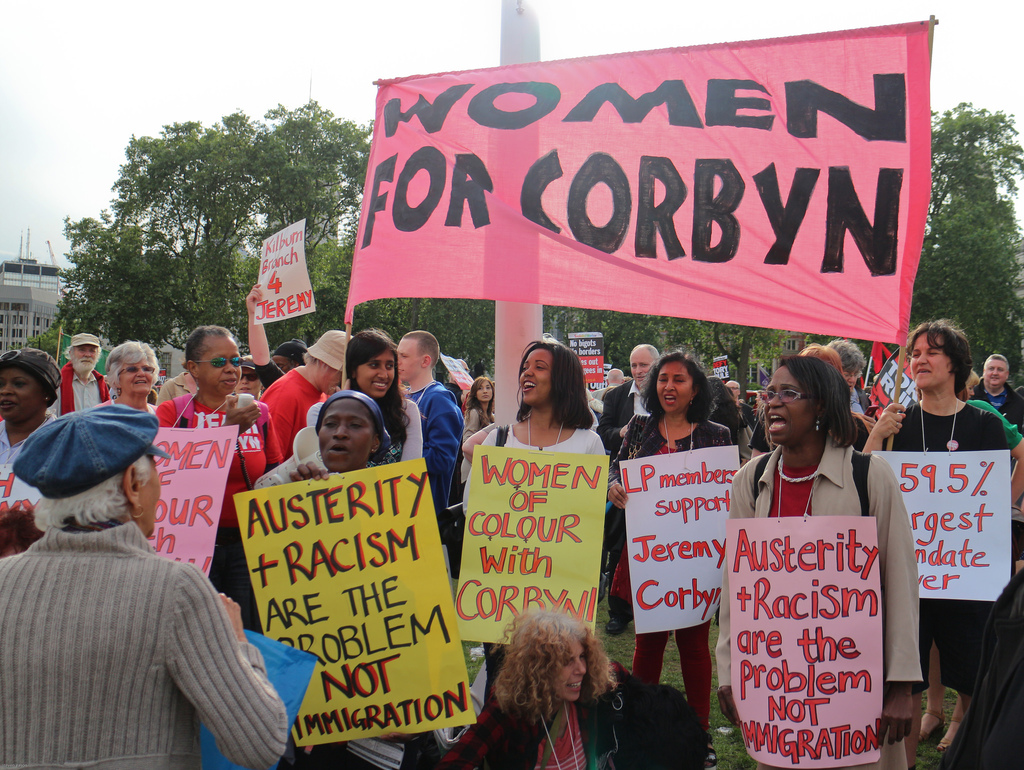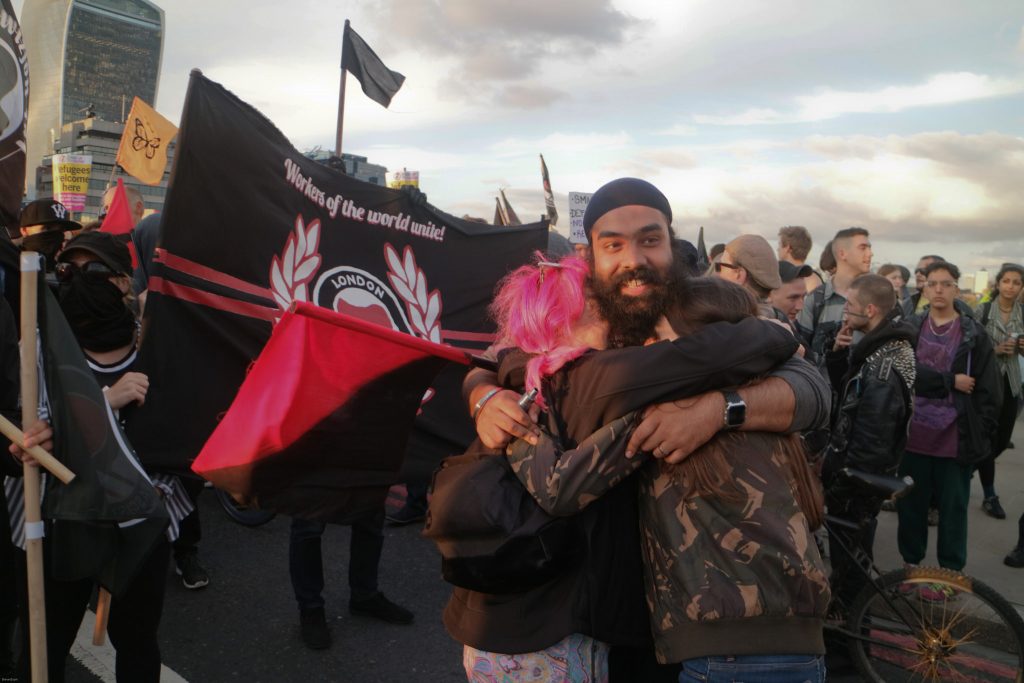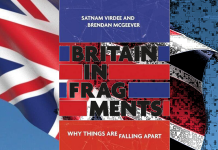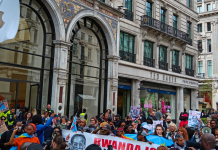By Rob Owen
June 24th was a dark morning. Colleagues at school arrived shell shocked at a result no one expected. Friend after friend asked in worried tones what the result would mean. Meshed with disbelief were two common fears: that Britain had crashed into economic chaos and that a previously hidden, racist and narrow minded, Britain had emerged out of the darkness. Other workplaces reported people bursting into tears amidst a generalised despair at the vote leave victory.
As the days wore on it became obvious that those emboldened by the referendum were the racist right. As the referendum campaign had developed, the terms of the debate had shifted more and more towards legitimising an increasingly open scapegoating of migrants. For a small but significant minority this spilled over into a generalized racism against people of colour. Anecdotal evidence suggested an increase racist incidents and Police forces soon reported a 57% increase in hate crime reporting. Press reports have highlighted incidents directed against Eastern European communities with leaflets calling on “Polish vermin [to] go home” appearing in different areas of the country.
Popular attitudes are being set against a backdrop of political and financial turmoil. The news has been dominated by coverage of the billions wiped of the value of British companies as the pound continues to fall. The reassurances that all will be well, from politicians who predicted economic meltdown in the result of a Brexit vote days before, have rung hollow. The sense of crisis, and lack of agency, permeates conversations of those who see themselves as broadly to the left.
The political fallout
The referendum itself had its origins in the political crisis of the Conservative party, and the epicentre of the crisis has continued to ravage the historic party of the British right. Within hours of the result David Cameron had tendered his resignation having failed to win the referendum he set in motion. His favoured successor, George Osbourne, remained out of the public eye for days appearing only to attempt to calm the markets by downplaying his predictions of economic chaos should Britain exit the EU. Key figures in Vote Leave, Boris Johnson and Michael Gove, called for Cameron to stay in office then quickly pushed Boris to the fore of the Tory leadership race. The other front runner, Remain supporter Theresa May, has consistently supported exit from the European Court of Human Rights and pushed for harsher rules on immigration. Boris himself has quickly moved to distance himself from aspects of Vote Leave’s propaganda, claiming: “EU citizens living in this country will have their rights fully protected” and has backtracked on Vote Leave statements about capping numbers of migrants. All wings of the Tory party are talking of a process of exit lasting for years in which any changes are carefully managed to protect the interests of British businesses.
The crisis has also found its echo in the Labour Party as the prospect of an early general election and heightened sense of crisis created cover for Corbyn’s enemies in the Parliamentary Labour Party. Resignations from the shadow cabinet were long planned and surprising only in their audacious timing. Despite warnings from the major unions not to “manufacture a crisis,” the PLP’s “vote of no confidence” in Corbyn quickly gained pace. The plotters are publicly hostile to Corbyn’s principled defence of immigration and “half-hearted” commitment to the Labour IN referendum campaign. On a deeper level, Labour MP’s sense a chance to topple the left and reclaim the party for the establishment ahead of a snap election, and seem willing to cripple the parties’ electoral chances in the process.

The only force to come out of the referendum well was the Scottish National Party, where Nicola Sturgeon has been able to articulate the sentiments behind remain and seek to frustrate moves towards Brexit with the democratic mandate of Scotland behind her. Prospects of a second independence referendum seem increasingly likely with the SNP well placed to deliver a YES to independence given the seeming disparity between the electoral views of the Scottish electorate and the electorate south of the border. The crisis of the Tories becoming a crisis of the British state remains a possibility if not an immediate prospect.
What of the far left?
Sadly the left has been largely peripheral to the debate with both Lexit (left exit) and left remain campaigns failing to make any impact on the debate. The left’s failure to engage can only be understood through a combination of material and political factors. The first being the origins of the referendum in a crisis of the political right which continued to shape the terms of the debate. As I wrote in the build up to the referendum:
“While big business and much of the political establishment supports retaining EU membership there is a substantial section of the Tory support base for whom the EU represents a weakening of British sovereignty, most often expressed in terms of control over “our” borders. There is also a material basis for a right-wing Brexit campaign amongst smaller businesses wanting freedom from EU regulations and sections of capital that believe a move away from “EU protectionism” could boost UK trade globally. Yet the popularity of the Brexit campaign is widely acknowledged, as evidenced by polling data, to be based around ideas of nationalism and increasing control of migration. This form of British nationalism, represented politically by many Tory backbenchers and UKIP, has never truly come to terms with the collapse of the British Empire and is inherently racist (see Paul Gilroy, ‘After Empire’).”
This as the referendum went on and Vote Leave alternated between abstract sloganeering and increasingly explicit dog whistle appeals to racist anti-migrant attitudes. The Remain campaign was also dominated by agendas of the political right, focusing heavily on the damage to the economy a Brexit would cause. These two arguments operated at different levels and rarely related to each other in a way that created a set of facts the public could engage with. Both played on fears and economic worries but neither convinced supporters that voting Remain or leave would improve people’s lives. Repeated surveys of leave voters suggest that the overwhelming majority did not believe that Brexit would improve their own lives but they despaired at the consequences of neoliberalism and distrusted the political establishment.
The left campaigns, “Lexit – the left leave campaign,” “Another Europe is Possible” and “Labour in for Britain” worked independently from the Tories but bar Labour IN made little headway in the campaign. The Corbyn-led Labour IN campaign was a principled attempt to distance themselves from the conservatives but their message, in favour of a reformist agenda in Europe, was met with little interest from the press. It may have been successful in mobilising sections of Labour’s base, with Labour supporters recording a two thirds majority for remain.
Lexit attempted to put forwards an anti-capitalist critique of the EU in solidarity with Greece and against fortress Europe, an analysis that all of us on the revolutionary left share. However, they badly misjudged what the narratives shaping the wider debate would be. In a referendum campaign within a net contributor to the EU their campaign failed to relate to people’s experience of EU membership. Very few industries, and no communities, experienced EU policy as a source of austerity. Neoliberal austerity had been driven enthusiastically by the Tories via Westminster. Outside sections of the labour movement, which backed exit on left nationalist grounds, Lexit arguments failed to engage with the wider debate – a debate which quickly became more about people’s experience and attitudes to migration, or their economic fears, than about the EU as an institution. The primary movers in the Lexit campaign were slow to recognise how interpretations of the vote were shaping up and seemed unable to match the current defensive tasks of the left to their analysis. The logical conclusion of this perspective was 100 supporters of the Lexit campaign protesting at Downing Street while over 1000 marched against racism in East London.

Left campaigners for Remain were better placed to recognise the growing threat of nationalism but elided the question of the nature of the EU. Campaigns like Another Europe is Possible gained limited traction by articulating a more radical vision of European reformism and reflecting the multicultural common sense of cities like London. Yet in articulating a vision that Europe could be reformed they also reinforced the idea that the question of EU membership was intertwined with our ability to defend migrants and progressive politics. In stating the truism that exiting the EU put freedom of movement within Europe under threat they sowed illusions that the EU itself guaranteed a more progressive attitude to migration. In doing so they did nothing to prepare people for a grassroots fight against racism after the referendum and increased the demoralisation of those involved when the vote was announced. By propagating a sense that voting remain was itself the key anti-racist act they unwittingly contributed to the disorientation of the left after the result. It is notable that no organisations who actively campaigned for remain have been in a position to call any anti-racist initiatives so far.
Have the working class become racist?
The referendum campaign, in particular the leave camp, has magnified and given legitimacy to anti-migrant politics in Britain. But it is important to recognise that such attitudes have always been present despite the advances of multi-cultural and anti-racist politics within working class communities. Older readers will remember Michael Howard’s racist election campaign in 2005, during which he said “It’s not racist to talk about immigration. It’s not racist to criticise the system. It’s not racist to want to limit the numbers. It’s just plain common sense” and ran a campaign on with the slogan “It’s not racist to impose limits on immigration.” Similarly readers will remember in 2009 when Labour Prime Minister Gordon Brown made his “British jobs for British workers” speech. Both major parties, Tory and Labour, have played with fire over immigration to appeal to populist arguments about the causes of economic crisis. The referendum has thrown these populist and racist attitudes to the fore of British politics but it neither created them nor does it mean they are unshakable.
Ideas around migration have long been the “acceptable” face of racism. Even the majority of remain voters will accept that some form of immigration control is necessary. Support for the freedom of movement that exists within the EU was never won with the general public and has been under consistent attack by the right-wing press since the accession of the Eastern European member states. The leave campaign exploited this fact to build a popular base and in doing so whipped up racism on the ground. Far from challenging it, senior figures in Remain attacked Vote Leave’s ability to bring down immigration levels and sought to reassure the “legitimate concerns” of voters. In doing so they contributed to pulling politics to the right. The radical left was too weak, and too focused on campaigning for Lexit or Remain, to stress the economic causes of the pain neoliberalism had inflicted and to and pose anti-racist solutions that stepped beyond the bounds of the referendum. In focusing on EU reform, large sections of the anti-racist left posed membership of the remote and unaccountable EU as a solution to the problems working class communities faced. In doing so Remain conceded ground to Vote Leave’s “take control” message that resonated with people’s distrust of a political establishment that had overseen decades of underinvestment. This does not mean that 52% of the working class has become racist overnight but that discontent with the status quo was successfully funnelled in a racist direction. The referendum will leave a racist scar on British politics for some time and has given confidence to the most reactionary voices in society. How long that will last is yet to be seen. A deeper analysis of the vote will undoubtedly show that people’s reasons for voting were complex and contradictory. The contradictory nature of people’s motivations means that both leave and remain voters can be engaged by future campaigns in solidarity with migrants and broader in broader anti-austerity struggles. Many who voted for greater immigration controls on the 23rd could be won to campaigns to stand in solidarity with migrants or against austerity alongside migrant workers in future.
What about the EU?
The impact of the Brexit vote was incredibly damaging for the European Union as a political project. An exit vote by the second largest economy in the Union has sent shock waves through the European Establishment who have reacted with disbelief. EU leaders are divided over what to do next and it is impossible to judge what the consequences of the crisis will be or what forces will ultimately be able to take advantage. A few days after the vote it seems that the immediate beneficiaries are the forces of the nationalist right, who already had a Eurosceptic support base, rather than the anti-capitalist left and social movements. It is also unclear what effect it will have on European border controls, or the Eurozone, if the Brexit vote triggers other referendums within other member states. Although it seems unbelievable an exit vote on this basis will weaken support for cooperation over Frontex, Europe’s border agency.
The gamble behind many Lexit comrades’ positions, that a crisis opens opportunities, for the left across Europe currently seems to be misguided at best. Notions of “political rupture” have always included an analysis of political interpretation and working class agency, and the Brexit vote is likely to be interpreted by the majority of working class militants as a nationalistic blow from the right against the EU. Whether that is outweighed by an increased space for social movements in the poorer European states against a weakened EU in future remains to be seen, but it seems a risky gamble.
Where next?
The left needs where possible to keep our heads and negotiate the difficult task of building a grassroots anti-racist movement. Doing so means tackling the difficult question of what is driving racist attitudes and avoiding counterfactual politics: It is deeply unlikely that a victory for remain would have prevented the racism stirred up by the referendum or protected migrant rights, given the record of remain advocates around Cameron on pandering to anti-immigration sentiments. The left should shed no tears over the fate of the EU – an institution we should instinctively oppose. Neither should we accept that that we can’t fight to make sure we don’t pay for the economic crisis. But we have to accept that the referendum damaged our side – dividing workers who see themselves as “British” against migrant workers – as much as it damaged our ruling class. It is fighting for solidarity to repair that damage that has to be our immediate task.
Whatever the result, we were going to be faced with the need to build anti-racist alliances and the difficult task of rebuilding an anti-capitalist left. As well as resisting racism and defending Corbyn against the right we need to keep alive the belief in our collective ability to reshape the future.




















There you go Rob, your mischief has opened the door to the sectarian left in Remain and their Godwin’s law meme.
Sorry getting tired,
I was right first time!
Should read:-
We certainly don’t want to be in a popular front with them, just because they *supported* Brexit.
‘Lexit’ was in reality a united front with UKIP and Boris Johnson, a red-brown alliance akin to the 1932 Nazi-KPD effort to oust the SPD from the government of Prussia by means of a referendum.
In both situations, the word “referendum” was involved.
Other than that, you’re talking complete bollocks.
The mainstream “Remain” campaign was jointly led by the Tories and the right-wing of the Labour Party – the same people who are now trying to force out Jeremy Corbyn. We certainly don’t want to be in a popular front with them, just because they opposed Brexit.
That would mean taking sides between May and Gove, or any other permutation of Tories.
It might also mean supporting a coalition government of Remain Tories, anti-Corbyn Labour and the the Lib-Dems at the next election. The contours of this are already coming into shape.
We’ve already see how certain Scottish ‘socialists’ are endorsing the SNP’s opportunistic dealings with the EU bureaucrats too.
That’s not what we need at all. We need a majority Labour government, based on the support of the unions.
This is only way to combat the sabotage of the careerists in the PLP.
That Labour government could easily split the working class component of “Leave” from UKIP and the right wing Tories.
It can do it with an anti-Austerity programme, by standing up to racism and xenophobia and by
uniting with workers across Europe who are opposed Austerity.
That’s very different to simply endorsing the EU based on half truths
-Half truths which many working class voters saw through.
Lexit was a united front with a range of organisations and activists on the left with different political views and histories. Hardly unusual for a united front. If you are arguing that the SWP should never have joined a united front with the CPB and RMT then I disagree. Lexit certainly did take a stand against racism – read the output on the website. The claim that comrades in Lexit weren’t on the anti-racism demo is wrong.
It was repeatedly acknowledged by those in Lexit that their influence in the leave campaign was very limited precisely because the debate had been pushed to the right by the range of forces I mentioned. Blaming Lexit’s alleged “mistaken analysis” for not cutting through or accommodating to the right seems highly specious.
‘Lexit’ was in reality a united front with UKIP and Boris Johnson, a red-brown alliance akin to the 1932 Nazi-KPD effort to oust the SPD from the government of Prussia by means of a referendum. I’m sure the KPD certainly “did take a stand against racism “even as they campaigned for what the racists and nativists wanted.
Reblogged this on Socialist Fight and commented:
The article is certainly a step forward from the position of rs21 on the referendum as was the flyer for the East London anti racist demo and sponsoring that demo too was real progress.
But still it is far too diplomatic, downplays the Lexit errors and fails to evaluate the forces on the left who voted remain to counter the obvious racist chauvinism of Brexit. In the CP place it is necessary to name names. The Morning Star / CPB led the Lexit campaigners with the RMT, the bakers and ASLEF. From opposing RACIST immigration controls way back in the days of Ted Heath Ted Grant also has made that CPB formulation their own. That amounts to political support for racist immigration controls because as we have just seen there is no other kind of immigration controls.
And that brings us to British jobs for British workers. That wasn’t simply Gordon Brown’s racism. It was borrowed from the fascists’s arsenal, it was embraced by Derek Simpson in the infamous Daily Star photo with two models hanging on his arms. And the Socialist Party’s support for the ‘local jobs for local people’ was as bad if not worse. The SWP were generally better on this before eventually capitulating. And that is the problem with the SWP, its gross opportunism. From welcoming the fall of the Berlin Wall to supporting rebels in Libya and Syria and Ukraine who were backed by global imperialism and never accounting both the SWP and the SP are pro imperialist when it seems a majority of workers are swept along by war propaganda. The SP generally grosser here but the SWP get there in the end also.
The big unions were remain as were Momentum with its claimed 10,000 members (the Labour Representation Committee took a fudged position). And as with Corbyn’s election the grassroots of Labour were clearly remain, recognising a racist threat when they saw it.
A surge of new membership applications is taking place in Labour in anticipation of the coming battles. The antisemitism witch hunts await the Chakrabati inquiry report any day now, the Chilcott report is due in just over a week and the left in Labour is rallying.
Any analysis of the situation cannot remain as limited as this one as, although it is clearly thrusting in the right direction. Not just a defence of immigrants (a new anti racist movement?) but also a fight within and without Labour for local councils to make a stance against the cuts. And the TU bureaucracy to take industrial action against them.
The article is certainly a step forward from the position of rs21 on the referendum as was the flyer for the East London anti racist demo and sponsoring that demo too was real progress.
But still it is far too diplomatic, downplays the Lexit errors and fails to evaluate the forces on the left who voted remain to counter the obvious racist chauvinism of Brexit. In the CP place it is necessary to name names. The Morning Star / CPB led the Lexit campaigners with the RMT, the bakers and ASLEF. From opposing RACIST immigration controls way back in the days of Ted Heath Ted Grant also has made that CPB formulation their own. That amounts to political support for racist immigration controls because as we have just seen there is no other kind of immigration controls.
And that brings us to British jobs for British workers. That wasn’t simply Gordon Brown’s racism. It was borrowed from the fascists’s arsenal, it was embraced by Derek Simpson in the infamous Daily Star photo with two models hanging on his arms. And the Socialist Party’s support for the ‘local jobs for local people’ was as bad if not worse. The SWP were generally better on this before eventually capitulating. And that is the problem with the SWP, its gross opportunism. From welcoming the fall of the Berlin Wall to supporting rebels in Libya and Syria and Ukraine who were backed by global imperialism and never accounting both the SWP and the SP are pro imperialist when it seems a majority of workers are swept along by war propaganda. The SP generally grosser here but the SWP get there in the end also.
The big unions were remain as were Momentum with its claimed 10,000 members (the Labour Representation Committee took a fudged position). And as with Corbyn’s election the grassroots of Labour were clearly remain, recognising a racist threat when they saw it.
A surge of new membership applications is taking place in Labour in anticipation of the coming battles. The antisemitism witch hunts await the Chakrabati inquiry report any day now, the Chilcott report is due in just over a week and the left in Labour is rallying.
Any analysis of the situation cannot remain as limited as this one as, although it is clearly thrusting in the right direction. Not just a defence of immigrants (a new anti racist movement?) but also a fight within and without Labour for local councils to make a stance against the cuts. And the TU bureaucracy to take industrial action against them.
Ray, no where ine the article are Lexit blamed for anything other then a mistaken analysis of the situation they faced. Their analysis led them to down play (which they still are) the racism expressed by the leave vote which resulted in their tiny demo. 4 people from SW came to sell papers at the edge of the anti-racist demo – it was a bad misjudgement of the popular mood.
The organisations behind lexit can either look at why they got the situation wrong or they can plow onto defending Corbyn and not think about it. The truth was the Ernest attempts to prove Lexit was credible in the course of the campaign (and keep the red flag aloft) led to a dismissal of the growing racism being stirred up behind the leave vote. That led to a failure to give proper emphasis to provide migration arguements because the lexit alliance relied on a chuck of the TU left with communist type politics and a bad line of controlling immigration.
The lexit alliance was misjudged and played no useful roll in making the decent comrades taking a lexit position more then the sum of their parts.
I’m not defending the left remain position but I do celebrate the anti-racist instincts of the many many people who voted on anti-racist grounds.
Southpaw, I think you’re using the term racist to mean someone who systematically has their views shaped by racism.
I’m arguing that taken as a whole the interpretation of a leave vote was shaped by a regressive appeal to ideas of British nationalism and the conclusion that immigration is a major cause of economic woes. That does not mean that for many working class leave voters it was not also a rejection of an establishment from which they are disenfranchised nor that it wasn’t about austerity. It is saying that those issues were framed in terms of hostility to immigration – seeing freedom of movement as a threat which is inherently a racist conclusion. The shifting terms of the debate also legitimised comments that were more and more explicitly racist.
The referendum marked a qualitative shift in public ally expressed ideas about immigration and gave confidence to racists to air and act on their views.
This is the immediate consequence we have to turn and face and is why the post referendum turf is largely unfavourable to the left. It is a defensive terrain if one where we have a radicalised and political audience in which to build a grass roots anti-racist movement.
Southpaw’s bizarre argument that Brexit was a victory for us because it was a vote against the elite mirrors the American SWP’s excitement over Trump’s ascendance. As they wrote: “Far from representing a rising rightist movement, Trump gets a hearing from workers and others who have been battered by the effects of years of the world capitalist economic crisis, and who are looking for something different from ‘establishment’ politicians they know offer no solutions.”
I agree we are unfavorable terrain and must wage a defensive campaign. Unfortunately, Jeremy Corbyn is now positioning the Labour Party as the party of ‘Lexit’ and no one — not his supporters nor his opponents in the parliamentary party — is even discussing this!
Apart from Billy Bragg where are the voices of all those artists, actors, writers and other members of the cultural establishment who came out in support of remain, claiming its progressive nature, when it comes to defending Corbyn, the one political leader who is committed to stopping the cuts, reversing austerity and funding the arts? Apart from a few artists supporting Corbyn, my Facebook feed has gone very quite after the constant barrage of remain propaganda from the hundreds of artists I know. I hope they will overcome their disappointment and rally round.
It’s one thing to acknowledge that Lexit had little influence on the Leave campaign but to argue that it failed to address migration, racism and austerity and focused on the EU as an institution is completely untrue. And why would it not be the case that Lexit supporters were on both demos? It’s not as if there are no Lexit supporters in the East End or only 100 in total in the whole campaign. The logical conclusion of this article is that, apparently, once again, the revolutionary left failed to relate to the class and let the right take the lead. I just don’t buy that.
Considering that the referendum was dominated by the UK ruling class, split into those who aligned with the interests of international capital vs those whose interest lay in succession, not to mention the intervention of imperialist interests abroad and the juggernaut of the right-wing and liberal media, all focusing the debate on immigration is it any wonder that the small organised left in the UK struggled to be heard? This is not a recent phenomenon aggravated by the politics of Lexit but a long term symptom of defeats inflicted on workers. Even on a bad day, if Corbyn and the main unions had come out in favour of leave this would have had a million times more impact than Lexit could ever have done. Yet it’s Lexit who have let the class down!
There are no short cuts to rebuilding the left. No novel organisational systems that will rescue us. If Corbyn, elected by the largest majority of any UK political leader, is being driven out by 175 Labour MP’s who all voted for Tory welfare cuts are you seriously arguing that Lexit had a chance of steering the referendum debate away from immigration?
The position to take now is to unite in support of Corbyn and to continue (when have we ever stopped?) campaigning against cuts, austerity and racism regardless of the ideological onslaught ranged against the left by the ruling class, the media and the Blairites. The fact that we will no longer have an unaccountable and undemocratic layer of EU bureaucrats backing up our ruling class in this struggle is a step forward.
Rob, I did read all your piece. I agree with you that the ‘front bench team were waiting for their moment’.
But it’s undeniable that the Out vote was heavily concentrated in the working class areas outside of cities (and not all of the cities e.g Sheffield).
I’m not buying people voted Out for just racist reasons as some argue. I’m sure it’s part of it but they didn’t support UKIP in the last election in the same way. If I was racist,
I’d have voted UKP in the General Election just over a year ago if I was a racist (thinking the Tories too soft and BNP etc a waste of time). So what were the UKIP figures (GE 2015) compared to the Referendum Out figures? These figures are only half-useful as constituencies are not the council area data we have for Referendum votes but the differences are stark: Barking (62% Out v 22% UKIP), Oldham (61% v 23%) and Boston (76% v 33%).
We should go with those who voted ‘Out’ against the elite. June 24 wasn’t a ‘dark morning’. It was what meteorologists call ‘changeable’ – and that’s good.
I don’t see why this means that we shouldn’t, as a matter of urgency, attempt to build an anti-racist, pro-migrant campaign. This should be independent of events within the Labour Party, though I accept that events within the Labour Party will have an impact on how this movement develops.
I suspect you at best half read the piece as it explicitly talks about the developments in Labour today.
My strong view is that the front bench team were waiting for their moment and had remain won that moment may have come at the same pace or slightly slower but it would have come non the less.
My point is that it is the referendum campaign and the lack of social forces contesting the broader issues it magnified /distorted rather then the leave (or a counter factual remain) vote that caused the problems we are facing. Coming as it did from a crisis of the right.
I thought conflating racism and immigration concerns was a liberal thing.
Oh well, drive down wages, and make life hell for migrants, that’s the capitalist way.
https://therulingclassobserver.wordpress.com/2016/06/25/of-labels-the-doors-of-perception/
Has the writer of this article not got out of bed today? Has he not seen what has happened in the Labour party today.?
Now – like possible increased racism with Brexit (although Remain signed up for this, too), things may go sour. Corbyn may be kept off the ballot paper – or lose (all heaven will be used against him in a campaign).
But the Right might split to form a new party or he wins and Right are deselected. It’s the Labour Party – so it’s always limited but such would be an advance
None of this may happen – but it could. But with Remain it would still be last week.
Stasis gets us nowhere whereas disruption is pregnant with possibilities.